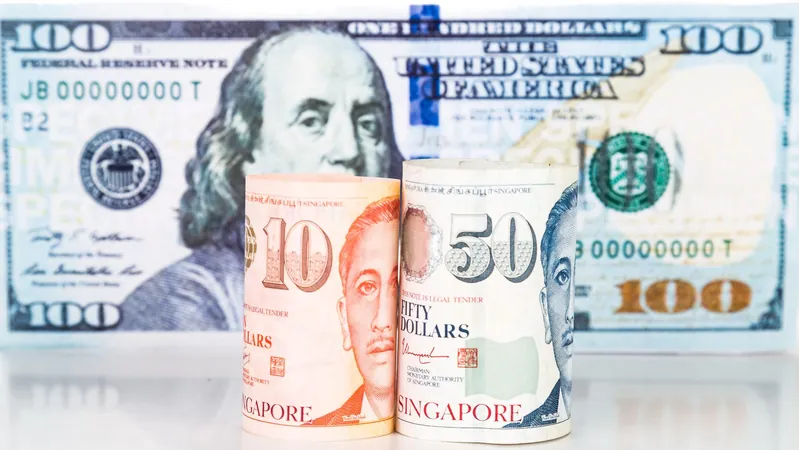
Asian Currencies Plummet as US Dollar Soars Following Trump's Presidential Victory
2024-11-07
Author: Daniel
SINGAPORE: Asian Currencies Face Decline
In a dramatic turn of events, the Singapore dollar, Malaysian ringgit, and Thai baht experienced notable declines today, leading a wave of downward pressure on Asian currencies as the US dollar surged following Donald Trump's incendiary victory in the presidential election.
The Singapore dollar fell sharply by 1.6%, hitting a three-month low and marking its steepest single-day drop since November 2011. Meanwhile, the Malaysian ringgit, which had been the standout performer in Southeast Asia this year, plummeted by 1.3%, sinking to levels not seen since mid-August.
Economic analysts anticipate that Bank Negara Malaysia (BNM) will maintain its key interest rate steady at 3.00%. Earlier this week, BNM assured the public that it is prepared to intervene in the market to mitigate any excessive volatility affecting the ringgit.
Similarly, Thailand's baht faced a 1.3% decline, reaching a two-month low, while South Korea’s won succumbed to a 1.5% drop, touching its lowest point since April. The Indonesian rupiah also felt the brunt of the US dollar's rise, dipping 0.8% to approach a near three-month low, with the Indonesian central bank standing ready to stabilize the currency if necessary.
Ken Cheung Kin Tai, chief Asian FX strategist at Mizuho Bank, remarked that regional investors are deeply apprehensive about the effects of potential tariffs, given that many Asian economies hinge on trade growth.
Markets will be closely observing potential vulnerabilities; MUFG analysts warn that the South Korean won, Singapore dollar, Malaysian ringgit, and Thai baht could confront considerable obstacles due to their export-dependent nature and susceptibility to any economic slowdown in China.
In a broader context, the Mexican peso and Chinese yuan are particularly at risk as the US dollar strengthens amidst expectations of heightened tariffs under Trump's administration. The peso recently hit its lowest value against the dollar since August 2022, trading at 20.7080.
Across Asia, stock market reactions were mixed: Seoul’s market declined by 1%, while Taiwanese shares climbed by 1% and Kuala Lumpur’s index edged up by 0.4%.
Trump was officially declared the 47th president early Wednesday morning after securing Wisconsin, which tipped him past the crucial threshold of 270 electoral votes. Analysts predict that Trump's proposed tariffs and immigration policies will likely exacerbate inflation and lead to a rise in bond yields, exerting pressure on the currencies of trading partners.
The dollar index, measuring the dollar against six major currencies, saw a rise of 1.42%, reflecting heightened uncertainty in the markets. US Treasury yields also spiked to multi-month highs, propelled by the early election returns favoring Trump, particularly in Republican-leaning states.
As the dust settles on Trump's victory, market participants are left questioning the future trajectory of Asian currencies. Will they continue to falter, or is there hope for a turnaround? Only time will tell as regional markets adjust to the new political landscape.


 Brasil (PT)
Brasil (PT)
 Canada (EN)
Canada (EN)
 Chile (ES)
Chile (ES)
 España (ES)
España (ES)
 France (FR)
France (FR)
 Hong Kong (EN)
Hong Kong (EN)
 Italia (IT)
Italia (IT)
 日本 (JA)
日本 (JA)
 Magyarország (HU)
Magyarország (HU)
 Norge (NO)
Norge (NO)
 Polska (PL)
Polska (PL)
 Schweiz (DE)
Schweiz (DE)
 Singapore (EN)
Singapore (EN)
 Sverige (SV)
Sverige (SV)
 Suomi (FI)
Suomi (FI)
 Türkiye (TR)
Türkiye (TR)